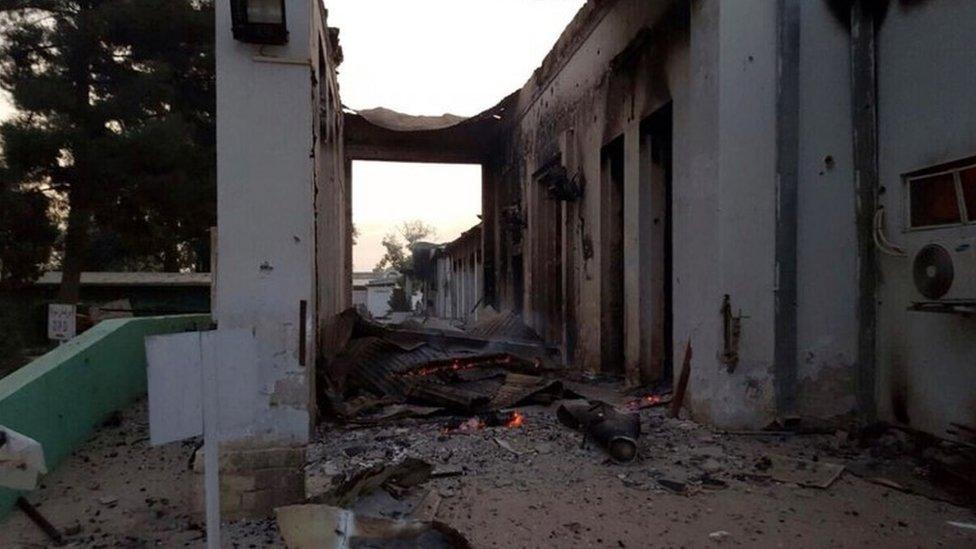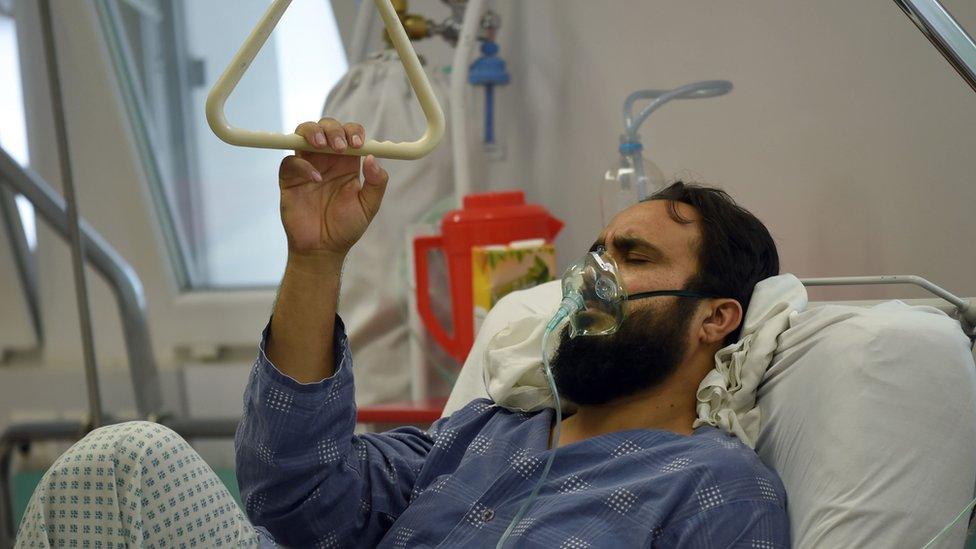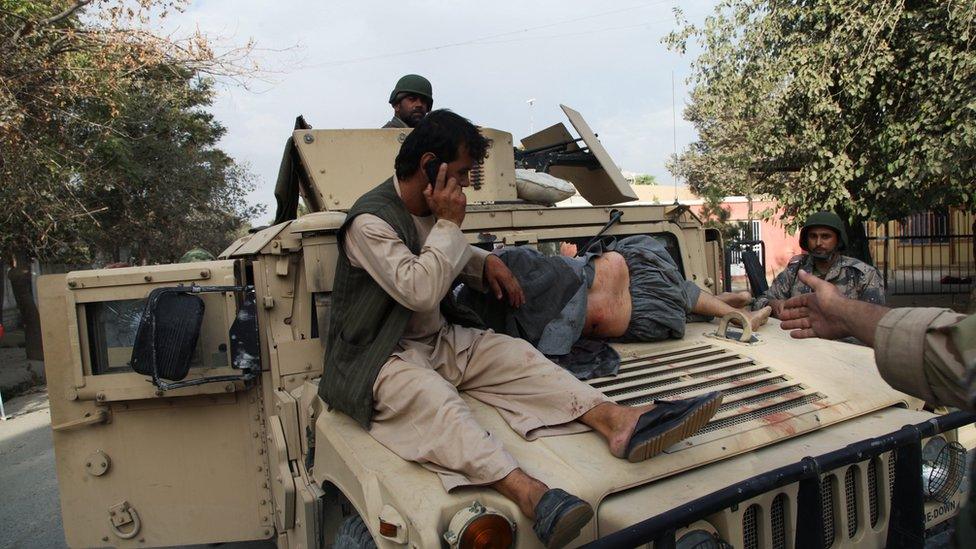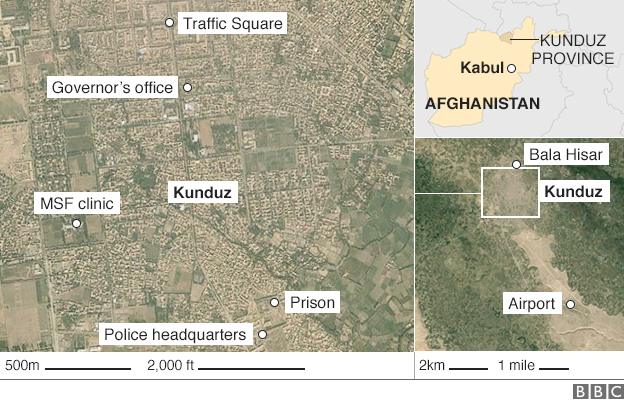Kunduz bombing: MSF demands Afghan war crimes probe
- Published

MSF insist everyone knew the location of the hospital in Kunduz and its bombing could not have been a mistake
Aid agency Medecins Sans Frontieres is seeking to invoke a never-used body to investigate the US bombing of its hospital in the Afghan city of Kunduz.
MSF said it did not trust internal military inquiries into the bombing that killed at least 22 people.
The International Humanitarian Fact-Finding Commission, external (IHFFC) was set up in 1991 under the Geneva Conventions, external.
The US says last Saturday's bombing was a mistake. It came amid efforts to reverse a Taliban takeover of Kunduz.
Kunduz, a strategically significant city of about 300,000 inhabitants in north-west Afghanistan, was quiet for the first night in more than a week, reports said.
Security forces say they have spent the past few days mopping up Taliban remnants and sporadic fighting has been largely confined to the outskirts.

IHFFC explained
It is not a court - it just gathers facts and submits recommendations
Set up in 1991 to investigate serious breaches of international humanitarian law - but never used
US and Afghanistan not among 76 signatories
For inquiry to start, parties to dispute must consent
In depth:

Protected status
MSF says the co-ordinates of the hospital were well-known and its bombing could not have been a mistake. The aid agency - winner of the 1999 Nobel Peace Prize - has said it is proceeding from the assumption that the attack was a war crime.
A number of inquiries have been ordered - by the US Department of Justice, the Pentagon, Nato and an American-Afghan team.
But MSF chief Joanne Liu told reporters in Geneva: "We cannot rely on internal military investigations by the US, Nato and Afghan forces."
MSF chief Joanne Liu: 'A grave breach in international humanitarian law'
She clarified that the IHFFC was "the only permanent body set up specifically to investigate violations on an international humanitarian law".
"We ask signatory states to activate the commission to establish the truth and to reassert the protected status of hospitals in conflicts," she added.
"If we let this go, we are basically giving a blank check to any countries at war," Ms Liu said, external.

The strike killed 12 MSF staff members and wounded a number of others

Afghan forces have struggled to reassert control over Kunduz
According to the IHFFC provisions, an inquiry needs the specific endorsement of the parties to the conflict. Neither the US, nor Afghanistan is a signatory, and therefore they would have to issue separate declarations of consent to the investigation of the Kunduz bombing.
On Tuesday, Gen John Campbell, US commander of international forces in Afghanistan, said the attack had been requested by Afghan forces who were in communication with American special operations troops at the scene.
Those US forces in turn were in contact with the AC-130 gunship that fired on the hospital, he said.
"We would never intentionally target a protected medical facility," Gen Campbell told the Senate Armed Services Committee in Washington.

Differing US statements on hospital strike
Saturday - Col Brian Tribus, spokesman for US Forces in Afghan
US forces conducted an airstrike in Kunduz city at 2:15am (local), Oct 3, against individuals threatening the force. The strike may have resulted in collateral damage to a nearby medical facility. This incident is under investigation.
Sunday - Pentagon press office
US forces conducted an airstrike in Kunduz city at 2:15am (local), Oct 3, against insurgents who were directly firing upon US service members advising and assisting Afghan Security Forces in the city of Kunduz. The strike was conducted in the vicinity of a Doctors Without Borders medical facility.
Monday - Gen John Campbell, US military chief in Afghanistan
We have now learned that on October 3, Afghan forces advised that they were taking fire from enemy positions and asked for air support from US forces. An airstrike was then called to eliminate the Taliban threat and several civilians were accidentally struck. This is different from the initial reports, which indicated that US forces were threatened and that the airstrike was called on their behalf.
Tuesday - Gen John Campbell to the Senate committee
On Saturday morning our forces provided close air support to Afghan forces at their request. To be clear the decision to provide aerial fires was a US decision, made within the US chain of command. A hospital was mistakenly struck. We would never intentionally target a protected medical facility… I assure you that the investigation will be thorough, objective and transparent.

Read more on the battle for Kunduz:
Residents' tales of fighting in Kunduz
In pictures: How Kunduz 'recapture' unfolded
Crucial capture: Taliban's biggest victory since 2001
Who are the Taliban? A guide to the complexities and conflicts within the militant group
Taliban selfies: The militants posing for pictures as they seized the city